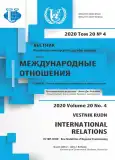Farmers-Herdsmen Conflict in Africa: The Case of Nigeria
- Authors: Oghuvbu E.A.1, Oghuvbu O.B.2
-
Affiliations:
- Covenant University
- Delta State University
- Issue: Vol 20, No 4 (2020): New Modalities of Regional Peacekeeping
- Pages: 698-706
- Section: THEMATIC DOSSIER
- URL: https://journal-vniispk.ru/2313-0660/article/view/320254
- DOI: https://doi.org/10.22363/2313-0660-2020-20-4-698-706
- ID: 320254
Cite item
Full Text
Abstract
Keywords
About the authors
Ejiroghene Augustine Oghuvbu
Covenant University
Email: augustine4best@yahoo.com
Assistant Lecturer, Department of Political Science and International Relations, College of Leadership and Development Studies Ota, Ogun State, Federal Republic of Nigeria
Oluwatobi Blessing Oghuvbu
Delta State University
Email: bfamuti@gmail.com
PhD Candidate, Department of Library and Information Science, Faculty of Education Abraka, Delta State, Federal Republic of Nigeria
References
- Abbass, I.M. (2014). No Retreat No Surrender Conflict for Survival between Fulani Pastoralists and Farmers in Northern Nigeria. European Scientific Journal, 8 (1), 331-346. URL: https://eujournal.org/index.php/esj/ article/view/4618 (accessed: 12.07.2020)
- Adeleke, M. (2018). The Increasing Spate of Killings in Nigeria: Cases, Causes and the Needful. African Development, 2 (2), 32-45
- Adisa, R.S. & Adekunle, O.A. (2010). Farmer-Herdsmen Conflicts: A Factor Analysis of Socio-economic Conflict Variables among Arable Crop Farmers in North Central Nigeria. Journal of Human Ecology, 30 (1), 1-9. doi: 10.1080/09709274.2010.11906266
- Adisa, R.S. (2012). Land Use Conflict between Farmers and Herdsmen - Implications for Agricultural and Rural Development in Nigeria. In: Adisa, R.S. (Eds.). Rural Development: Contemporary Issues and Practices. London: IntechOpen. Р. 99-118. doi: 10.5772/45787
- Ahmed-Gamgum, W.A. (2018). Herdsmen and Farmers Conflict in Nigeria: Another Dimension of Insecurity. Journal of Public Administration and Social Welfare Research, 3, 35-62
- Ajibefun, M.B. (2018). Social and Economic Effects of the Menace of Fulani Herdsmen Crises in Nigeria. Journal of Educational and Social Research, 8, 133-139. doi: 10.2478/jesr-2018-0024
- Akorede, O.P. (2018). Implications of Farmers-Herdsmen Conflicts on Nigeria’s Cohesion. Journal of Multidisciplinary Studies, 7 (3), 22-45
- Aliyu, M.K., Ikedinma, H.A. & Akinwande, A.E. (2018). Assessment of the Effect of Farmers-Herdsmen Conflicts on National Integration in Nigeria. International Journal of Humanities and Social Sciences, 8 (10), 118-128. doi: 10.30845/ijhss.v8n10p13
- Alozie, C.C. (2019). Communal Conflicts and Challenges of National Integration in Nigeria in the 21st Century. International Journal of Social & Management Sciences, 2 (1), 39-50. URL: https://www.zeetarz.com/ijsms/ wp-content/uploads/2019/01/The-Poverty-Syndrome-and-the-Challenges-of-National-Development-in-Contemporary-Nigeria.pdf (accessed: 23.07.2020)
- Audu, S.D. (2013). Conflicts among Farmers and Pastoralists in Northern Nigeria Induced by Freshwater Scarcity. Developing Country Studies, 3 (12), 25-32
- Clara, T.V. (2017). Insecurity, Loss of Lives and Policy Issues in Nigeria. African Affairs, 4 (2), 67-79
- Conroy, S. (2014). Land Conflicts and Lethal Violence in Nigeria: Patterns, Mapping and Evolution (2006-2014). IFRA-Nigeria Working Papers Series, 38, 1-38
- Doyin, T. (2017). An Empirical Investigation to Incessant Killings in Nigeria. Journal of Philosophy, 5, 67-82
- Gefu, J.O. & Kolawole, A. (2002). Conflict in Common Property Resource Use: Experiences from an Irrigation Project. The Commons in an Age of Globalisation: The Ninth Biennial Conference of the International Association for the Study of Common Property. Victoria Falls, Zimbabwe. June 17-21. URL: https://dlc.dlib.indiana.edu/dlc/bitstream/handle/10535/1034/gefuj080502.pdf?sequence=1&isAllowed=y (accessed: 17.07.2020)
- Gleick, P.H. (2014). Water, Drought, Climate Change, and Conflict in Syria. Weather, Climate, and Society (WCAS), 6 (3), 331-340. doi: 10.1175/WCAS-D-13-00059.1
- Goke, S. (2018). The Genesis of Farmers-Herdsmen Clashes in Nigeria. Journal of Social Sciences, 4 (2), 34-48.
- Moritz, M. (2010). Understanding Herder-Farmer Conflicts in West Africa: Outline of a Processual Approach. Human Organization, 69 (2), 138-148.
- Muhammed, I., Ismaila, A.B. & Bibi, U.M. (2015). An Assessment of Farmer-Pastoralist Conflict in Nigeria Using GIS. International Journal of Engineering Science Invention, 4 (7), 23-33.
- Mwamfupe, D. (2015). Persistence of Farmer-Herder Conflicts in Tanzania. International Journal of Scientific and Research Publications, 5 (2), 1-8.
- Ndubuisi, C.I. (2018). A Critical Analysis of Conflicts between Herdsmen and Farmers in Nigeria: Causes and Socioreligious and Political Effects on National Development. HTS Teologiese Studies / Theological Studies, 74 (1), 1-6. doi: 10.4102/hts.v74i1.5065
- Nformi, M.I., Mary-Juliet, B., Engwali, F.D. & Nji, A. (2014). Effects of Farmer-Grazer Conflicts on Rural Development: A Socio-economic Analysis. Scholarly Journal of Agricultural Science, 4 (3), 113-120. URL: http://www.scholarly-journals.com/sjas/archive/2014/March/pdf/Nformi%20et%20al.pdf (accessed: 07.06.2020)
- Nzeh, E. (2015). The Effects of Migration by Nomadic Farmers in the Livelihoods of Rural Crop Farmers in Enugu State, Nigeria. Global Journal of Science Frontier Research, 15 (3), 45-56
- Odoh, S.I. & Chigozie, C.F. (2012). Climate Change and Conflict in Nigeria: A Theoretical and Empirical Examination of the Worsening Incidence of Conflict between Fulani Herdsmen and Farmers in Northern Nigeria. Arabian Journal of Business and Management Review, 2 (1), 110-124
- Ofuoku, A.U. & Isife, B.I. (2009). Causes, Effects and Resolution of Farmers-Nomadic Cattle Herders Conflict in Delta State, Nigeria. International Journal of Sociology and Anthropology, 1 (2), 47-54. URL: https://academicjournals.org/journal/IJSA/article-full-text-pdf/181F8D9696 (accessed: 17.07.2020)
- Okoli, A.C. & Atelhe, G.A. (2014). Nomads against Natives: A Political Ecology of Herder / Farmer Conflicts in Nasarawa State, Nigeria. American International Journal of Contemporary Research, 4 (2), 76-88
- Okoro, J.P. (2018). Herdsmen / Farmers Conflict and Its Effects on Socio-Economic Development in Nigeria. Journal of Peace, Security, and Development, 4 (1), 143-158
- Shettima, A.G. & Tar, U.A. (2008). Farmer-Pastoralist Conflict in West Africa: Exploring the Causes and Consequences. Information, Society and Justice, 1 (2), 163-184
- Uroko, F.C. (2018). The Ethno-Religious Conflicts in Southern Kaduna of Nigeria: Causes and Implication for National Development. Afro Asian Journal of Social Sciences, 9 (2), 1-12. URL: http://www.onlineresearchjournals.com/aajoss/art/280.pdf (accessed: 17.07.2020)
Supplementary files









